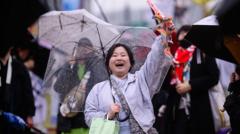In a decisive move, South Korea's acting president, Han Duck-soo, has declared that the country will conduct a presidential election on June 3. This announcement follows the constitutional court's ruling which upheld the impeachment of former president Yoon Suk Yeol after his controversial martial law declaration last December. The court's approval of the impeachment on April 4 necessitated a rapid election to fill the power vacuum.
During a press briefing, Han stressed the importance of quickly mending the nation's divisions, stating that South Korea must look "upward and forward" to heal from the tumultuous events of recent months. Yoon’s controversial and unsettling martial law declaration exacerbated pre-existing tensions in the country, resulting in widespread civil unrest and protests demanding his removal from office.
Yoon's actions, initially justified by claims of threats from both North Korea and internal "anti-state forces," were later viewed as a response to challenges within his administration. Yoon has since confronted serious legal troubles, including accusations of insurrection that have escalated his political downfall.
Among the potential candidates eyeing the presidency, labour minister Kim Moon-soo has officially entered the race by resigning from his cabinet position. Ahn Cheol-soo, a prominent lawmaker from the ruling People Power Party, has also shown interest in running after competing in previous presidential elections. Currently, opposition leader Lee Jae-myung, who narrowly lost to Yoon in 2022, stands as the frontrunner with a recent poll indicating an approval rating of 34%.
The political landscape remains polarized as South Korea struggles to emerge from Yoon’s turbulent tenure. While many South Koreans have expressed vehement opposition to Yoon's leadership, his supporters appear increasingly emboldened. Furthermore, the nation is grappling with a new economic landscape, marked by the imposition of a 25% tariff on South Korean exports to the U.S. by President Donald Trump, prompting government officials to seek negotiations with American authorities.
During a press briefing, Han stressed the importance of quickly mending the nation's divisions, stating that South Korea must look "upward and forward" to heal from the tumultuous events of recent months. Yoon’s controversial and unsettling martial law declaration exacerbated pre-existing tensions in the country, resulting in widespread civil unrest and protests demanding his removal from office.
Yoon's actions, initially justified by claims of threats from both North Korea and internal "anti-state forces," were later viewed as a response to challenges within his administration. Yoon has since confronted serious legal troubles, including accusations of insurrection that have escalated his political downfall.
Among the potential candidates eyeing the presidency, labour minister Kim Moon-soo has officially entered the race by resigning from his cabinet position. Ahn Cheol-soo, a prominent lawmaker from the ruling People Power Party, has also shown interest in running after competing in previous presidential elections. Currently, opposition leader Lee Jae-myung, who narrowly lost to Yoon in 2022, stands as the frontrunner with a recent poll indicating an approval rating of 34%.
The political landscape remains polarized as South Korea struggles to emerge from Yoon’s turbulent tenure. While many South Koreans have expressed vehement opposition to Yoon's leadership, his supporters appear increasingly emboldened. Furthermore, the nation is grappling with a new economic landscape, marked by the imposition of a 25% tariff on South Korean exports to the U.S. by President Donald Trump, prompting government officials to seek negotiations with American authorities.





















